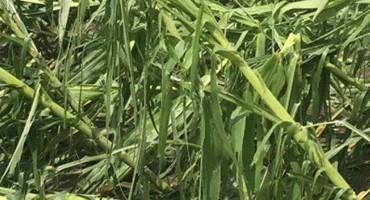Mr. Robert Nathan Gregory
After a June 14 severe thunderstorm dropped some of the state’s largest recorded hail on Noxubee County, row-crop farmland there suffered up to 50% yield loss.

Row-crop specialists with the Mississippi State University Extension Service met with affected growers at MSU Extension’s Noxubee County facility the morning after the severe storm to help them assess their next steps.
Of the state’s three primary row crops, corn likely faced the most losses due to the later stage of its development when the storm hit. Reports of hail and wind damage were also recorded on some cotton and soybean operations, but plant recovery or ample time for replanting are more likely for those crops because they had not been growing as long as corn.
“All the corn leaves were emerged, and when a storm defoliates all those leaves right before sensitive reproductive stages, it can cause heavy yield losses,” said Erick Larson, MSU Extension corn specialist. “When your corn is already developed fully and this happens, there’s not much you can do to salvage the crop. You’re stuck with the damage you have.”
MSU Extension cotton specialist Brian Pieralisi said his field observations varied from significant damage to total loss in some Noxubee County spots.
“A mile south of the damage, everything looks fine,” Pieralisi said. “The damaged plants’ survival depends on the environmental factors after the event. If the environment is conducive and you have a solid root system, the plant will bounce back, and you can make a decent late crop.
“Because of when this happened,” he added, “there are some cotton growers who will have to decide whether to abandon their crop and file an insurance claim or sink more money into making a crop.”
MSU Extension soybean specialist Trent Irby said most damage to that crop was limited to hail. While some of the affected fields had younger soybeans, others had already reached a more mature stage of growth.
“We started getting damage reports in the second weekend of June from several Delta counties,” he said. “From the wind perspective, the soybeans are still relatively small to have any major issues, but hail has been tough on some acres, knocking off leaves completely.”
Depending on the level of damage, some soybean fields may require replanting. In others, plants will likely survive but have delayed maturity.
Noxubee is regularly a top-10 producing county in Mississippi for all three of the major row crops.



